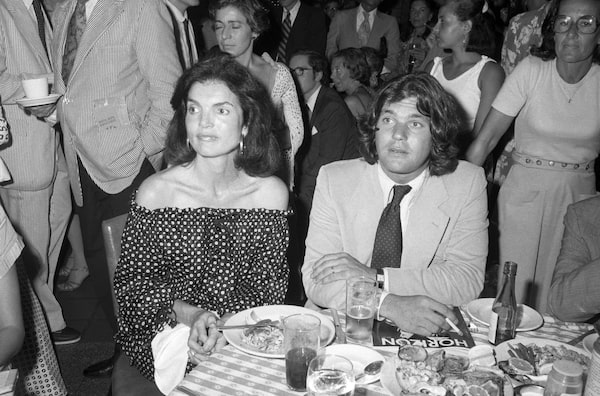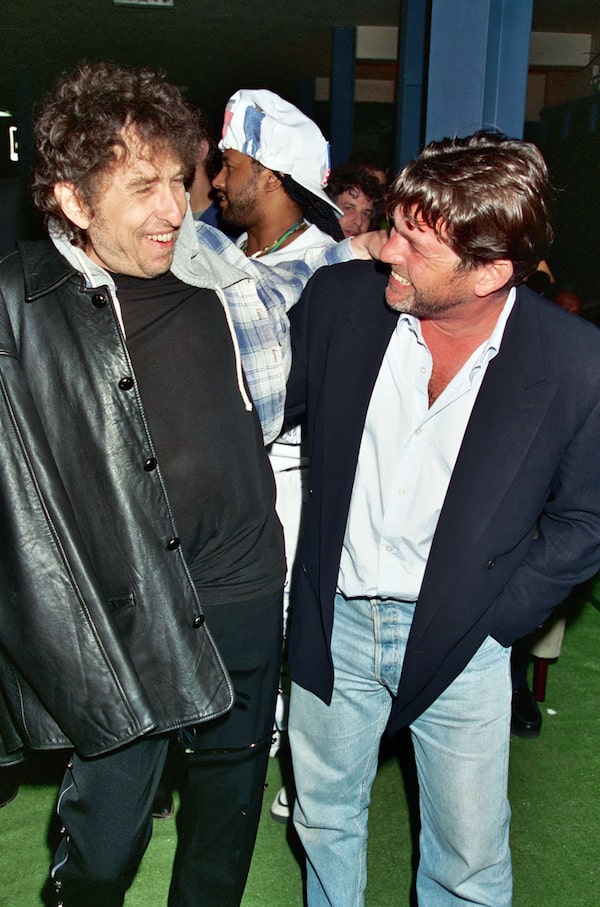
Paul McCartney, left, Jann Wenner, centre, and Ringo Starr attend the 30th Annual Rock And Roll Hall Of Fame Induction Ceremony in Cleveland, Ohio on April 18, 2015.Kevin Mazur/WireImage for Rock and Roll Hall of Fame / Getty Images
The title of Jann Wenner’s book is Like a Rolling Stone, the name of Bob Dylan’s first rock ‘n’ roll record. It’s a song about the loss of status, something that applies today to rock music. “People’s ears are different now,” Wenner tells The Globe and Mail. “They’re accustomed to different kinds of things.”
That same lessening of status applies to Rolling Stone, the iconic publication that in 1967 Wenner co-founded and named after the Dylan song. The magazine is no longer the counterculture force it once was, but the 76-year-old UC Berkeley dropout is proud of what he and others accomplished with Rolling Stone, now run by his son, Gus. “We gave voice to our generation, and we spoke to our generation.”

Handout
From his home in Montauk, N.Y., Wenner spoke about the magazine, a mythical sports editor, and the Rock & Roll Hall of Fame snubbing of a well-known Canadian band.
There’s some heady stuff about the glory days of Rolling Stone in your book. Do you miss it?
I wouldn’t trade it for anything. It’s inappropriate for me any longer, though, at my age. I’d love to go back for a few minutes or for a week or two, but, that said, I don’t want to miss a week with my kids.
Maybe a better question is, do we miss it? Hunter Thompson told you the demise of Rolling Stone would leave a nasty hole.
I feel the same as Hunter, except, in all honesty, is it just the demise of Rolling Stone, or does the demise of Rolling Stone reflect outside circumstances? The modes of communication, like the internet, have changed the culture so much.
There’s still a hole, though, right?
Yes. There’s no core. The sense of community and the sense of purpose and the organizing principles have been weakened. Rolling Stone, you know, was a clarion voice. But I don’t think you can bring it back. I don’t think the need for it is there any more.

Jackie Onassis and Wenner of Rolling Stone magazine share table at the Oyster Bar in Grand Central Station in 1977.Bettmann / Getty Images
No need for a clarion voice?
Well, you have that in other places. And they’re diverse. But all these things that Rolling Stone focused on, be they human rights, equal rights, marijuana laws, have moved along a great deal. And now the torch has been picked up by other people. It’s not to say the problems are solved, but there’s progress. It was not for us to finish the battle, but to start it.
There are chapters in your book dedicated to you watching Let it Be with John Lennon or hanging out with Boz Scaggs. What about the criticism about you being too chummy with the people Rolling Stone was writing about?
It was one of the greatest pleasures of my life to know the people and to become friends and to support them and encourage them and promote them, as individuals and as the whole field of rock ‘n’ roll. These people were not engaged in making defective washing machines or poisonous tobacco. They were making music for joy, and for people’s happiness. They brought wonderful things to the world.

Bob Dylan and Jann Wenner in 1995.Jeff Kravitz/FilmMagic / Getty Images
Couldn’t you have championed them without sharing limousines with them?
But that’s what helped make us so good – to have that access and those kinds of relationships. And nobody ever came up with any concrete examples of us pulling our punches or not telling the truth or distorting something.
Rolling Stone gave Mick Jagger’s She’s the Boss a four-star review.
Well, reviews are slightly different. Reviews are personal taste. Maybe I have enthusiasm for Mick because he was my friend or whatever. But I don’t consider that any violation of journalistic standards.
During the buildup to Taylor Swift’s latest album, Rolling Stone reported on her heavily. Then, when the album came out, it was branded an instant classic by the magazine. Because so much attention was paid to her, a positive review was a given, wasn’t it?
I don’t work there. I’m retired from it. But it’s the nature of the culture right now. It’s relentlessly promotional, and it’s driven by internet media.
What’s your status with the Rock & Roll Hall of Fame?
I’m chairman emeritus.
Burton Cummings is not happy with you. He thinks the Guess Who belongs to be in the hall.
I don’t recall their name ever coming up in a nominating committee meeting. But I don’t know why. Is it that they’re Canadian? That they’re pop? As I said before, it’s kind of a matter of taste.
There’s still some continuity from the old days on the Rolling Stone masthead. I notice the fictional Raoul Duke is still listed as sports editor.
[Laughs] Raoul Duke lives. What can I say, we just don’t hear from him very often. But he lives, and, who knows, he may come back.
Jann Wenner speaks to Indigo Books and Music chief executive Heather Reisman for a virtual event on Nov. 29. Information at indigo.ca/events.
 Brad Wheeler
Brad Wheeler